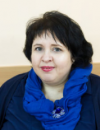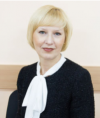Levina E. Y., Shibankova L. A. OLD NEW TRENDS IN EDUCATION: CONVERSION OF UNIVERSITIES. LIFELONG EDUCATION: The 21st Century.
2021. № 4 (36).
DOI: 10.15393/j5.art.2021.7165
| Issue 4 (36) |
Lifelong learning in the modern world: the research and design methodology |
|
OLD NEW TRENDS IN EDUCATION: CONVERSION OF UNIVERSITIES
 | | Levina Elena Yu.
Doctor of Pedagogical Sciences, Head of laboratory of Cognitive Pedagogy and digitalization of education
Institute of Pedagogy, Psychology and Social Problems
(Kazan, Russian Federation)
frau.levina2010@yandex.ru |
 | | Shibankova Liutsiia A.
PhD in Pedagogical Sciences, Associate Professor, Senior Researcher at the laboratory of Cognitive Pedagogy and digitalization of education
Institute of Pedagogy, Psychology and Social Problems
(Kazan, Russian Federation)
luz7@yandex.ru |
Keywords:
higher school
educational trends
high uncertainty
humanitarian dimensions
human conformity |
Abstract: the Russian higher school has been undergoing modernization for almost 30 years. The transformation covers the methodology, content, methods and the very organization of educational activities, based on trends in the development of education. The high level of uncertainty of external systems, coupled with the digitalization of all life activities, leaving an external contour, change the content of educational trends. Questions arise – how to maintain the significance and stability of the results of higher education in conditions of high dynamism and variability? Which way should universities move today in their development strategy? The authors carried out an analysis of global educational trends in education from the perspective of humanitarian dimensions, which determine, on the one hand, some stability of the received rational knowledge, and, on the other hand, ways to the development of a Person of the Future ready for a new complex world. In the course of the analysis, the potential of human conformity of the higher school (as opposed to human-centrism), based on the ideas of naturalness, cultural conformity and sociocentricity, is revealed. The results obtained can be used by the management and teaching staff of universities in designing strategic priorities of educational activities.
|
Paper submitted on: 11/08/2021; Accepted on: 12/03/2021; Published online on: 12/26/2021.
References
- Alexandrova V. D. Modern concept of circular economy. In: Mezhdunarodnyj zhurnal gumanitarnyh i estestvennyh nauk. 2019. Vol. 5-1. P. 87‒93. (In Russ.)
- Gilmeeva R. et all. Cognitive pedagogy: an educational and methodical manual. Kazan, 2020.228 p. (In Russ.)
- Levina E. Y., Gilmeeva R. Kh., Shibankova L. A. Cognitive capital of educational organizations: humanitarian orientation to the development of higher education In: Pedagogika. 2020. № 7. P. 91‒102. (In Russ.)
- Levina E. Yu. To the problem of managing the development of education: a stakeholder approach. In: Kazanskij pedagogicheskij zhurnal.. 2015. Vol. 6-1. P. 11‒15. (In Russ.)
- Levina E. Yu., Mukhametzyanova L. Yu. The development of a person of knowledge in the perspective of the cognitive paradigm. In: Kazanskij pedagogicheskij zhurnal. 2020. Vol. 3. P. 8‒19. (In Russ.)
- Gilmeeva R. et all. Scientific and methodological support of professional growth of a teacher in training: a scientific and methodological manual. Kazan, 2019. 156 p. (In Russ.)
- Nekhorosheva E. V. Application of a network-centric approach in education in order to form skills of the future. In: Vestnik Moskovskogo gorodskogo pedagogicheskogo universiteta. Series: Philosophical sciences]. 2020. Vol. 1. P. 58‒65. (In Russ.)
- Ratner S. V. Circular economy: theoretical foundations and practical applications in the field of regional economics and management. In: Innovacii. 2018. Vol. 9. P. 29‒37. (In Russ.)
- Sobolnikova E. N. Normative dimension of humanitarian knowledge. In: Vestnik Leningradskogo gosudarstvennogo universiteta im. A. S. Pushkina. 2019. № 1. P. 114‒120. (In Russ.)
- Khutorskoy A. V. Scientific school of human-like education: concept and structure. In: Izvestiya Volgogradskogo gosudarstvennogo pedagogicheskogo universiteta. 2009. Vol. 6. P. 4‒11. (In Russ.)
- Luksha P., J. Spencer-Case, J. Kubista. Educational ecosystems: Emerging practices for future education. Moscow School of Management SKOLKOVO and Global Education Futures.2020 [Electronic resource]. Electron dan. Access mode: http://learningecosystems2020 .globaledufutures.org/#learning (date of acсess: 24.09.2021).
Displays: 1763; Downloads: 389;
DOI:
http://dx.doi.org/10.15393/j5.art.2021.7165













